#god. this took me so long ajakljflkdsjglhnfdg
Explore tagged Tumblr posts
Text
so i wanted to make a more in-depth post with manga panels to kind of build up my defense of why i think hohenheim is really harshly misjudged by the fandom at the large. this isn’t to say i think all of his choices were pristine or free of criticism, but i think people tend to not give him the benefit of the doubt where it ought to be due because they’re often analyzing his character exclusively from ed’s pov rather from the pov of an eventually omniscient audience, and each lens builds a very different analysis and picture of his character (+ as someone mentioned, there are pretty distinct differences in between the way the anime adaptations portray him and the way the manga portrays him). essayed rambling under the cut
when hohenheim leaves resembool, ed and al are more or less toddlers. it’s expected that their memories of him are severely obscured and that, esp in ed’s case, this is going to impact how hohenheim is viewed by them, regardless of whatever his reasons are for leaving. ed is supposed to be an unreliable narrator to an extent bc he’s operating purely off of obscurity of information and projected grief and frustration, and that’s normal. he was a child when all of this happened, and he can’t be expected to feel completely rational about it. but the thing is, a defense of hohenheim isn’t meant to somehow criticize ed - not even the manga tries to do that. on multiple occasions, hohenheim expresses regret and apologizes to others for not being able to fulfill his duties as a parent
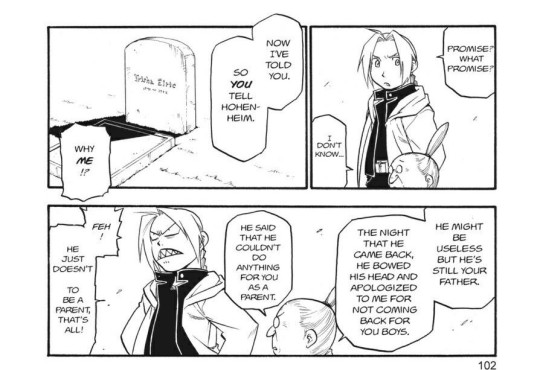
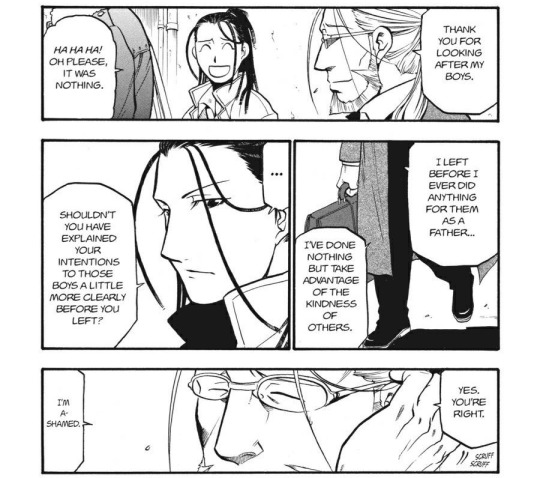
where i think people tend to go astray in their assignment of blame to hohenheim is in the details of how much he did or didn’t know about what happened to trisha (and then the kids) before finally returning to resembool ten years later, and his responsibility or fault as a parent by way of that. trisha is hardly into her twenties when hohenheim leaves, and she theoretically has her whole life ahead of her. she and hohenheim even make a promise to each other to grow old and die together, so she knows he’s supposed to come back and is never operating under the assumption that he won’t. she just knows it’ll take time. what hohenheim is unable to account for is the sickness that passes through town soon after and takes trisha’s life, and additionally the fact that no one knows how to reach him to let him know. resembool is a small farming town out in the middle of nowhere. the news of a woman dying of illness isn’t something worthy of being projected all across the country to the point that hohenheim might actually hear of it

additionally, trisha dies in 1904 (according to brotherhood, at least, we aren’t given a specific year in the manga and can only operate off of her having died sometime shortly before the conclusion to the ishvalan war in 1908), and not much happens for five or so years afterward. izumi takes on ed and al as apprentices shortly before the war ends, and the brothers attempt to resurrect their mother sometime after january 1910, according to a photo of them as normal children in one of pinako’s photo albums. mustang visits them shortly thereafter, and ed recovers for a year before applying to become a state alchemist. there’s another photo in one of the albums that shows he receives the watch in october 1911, so at best, he’s been a state alchemist for three years or less before the events of the main story begin. i also think it’s worthy of note that ed initially gives false information to the amestrian military personnel with regards to his automail. he tells them he has it as a result of the ishvalan war. obv, there’s other personnel he and al meet as the story progresses who learn the truth about what they did, but it’s not some publicly known fact, and strangers they meet are surprised and shocked if or when ed and al divulge the story to them
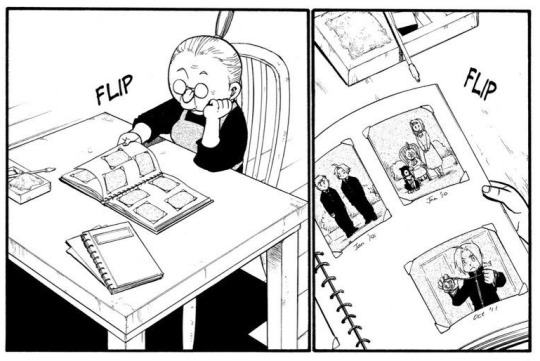
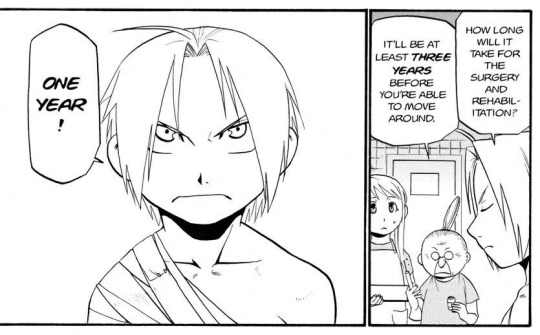
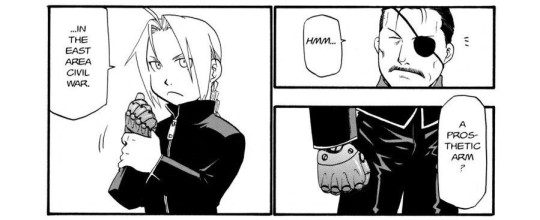
with all this in mind, hohenheim returns to resembool maybe three years since ed takes upon his state alchemist duties. there’s nothing out of the ordinary about his demeanor as he returns, until he walks to where his house is supposed to be to see that it’s no longer there, and he goes to pinako’s house in confusion. he and ed reunite in the following chapter at trisha’s grave, and hohenheim mumbles about trisha and their promise in a daze as ed rages about him. we also find out that pinako told him about ed and al performing human transmutation. so most explicitly, we learn through this scene that he had no idea of what his sons had done while he was gone (aside from ed becoming a state alchemist), and implicitly, there’s also an impression given that in addition to not expecting to see his house burned down, he didn’t expect to learn that trisha had died either. remember, she was hardly into her twenties when he left. thirty wasn’t an unrealistic age for a healthy person to live to and he always expected he would come back to her and they would resume their lives together. maybe one can argue that he did find out somehow by word of mouth in central city, but why would the public at large be concerned with whether the fullmetal alchemist had a mother or not?

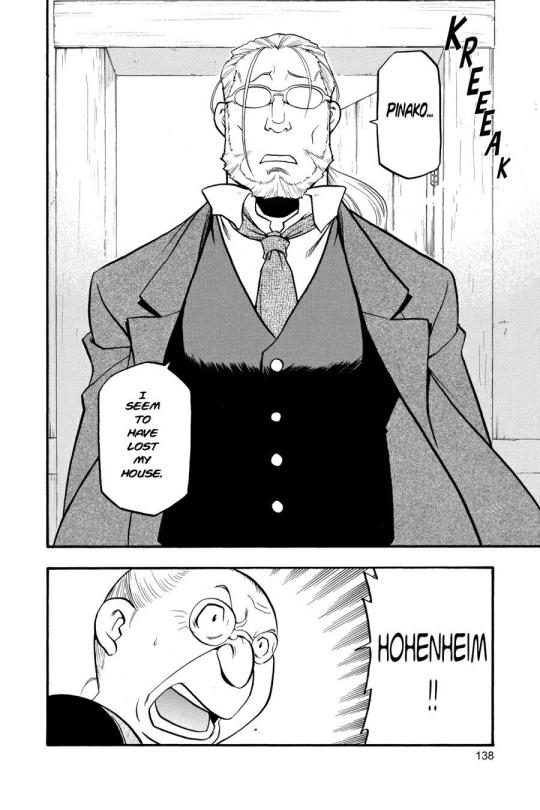
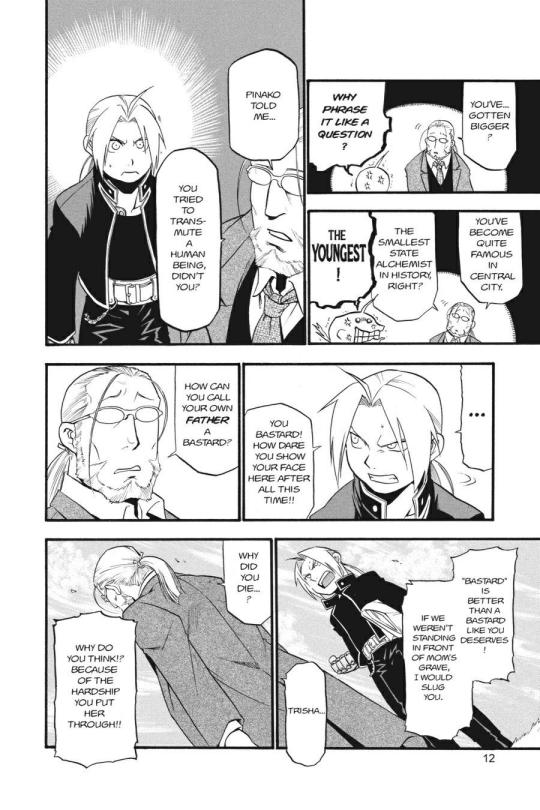
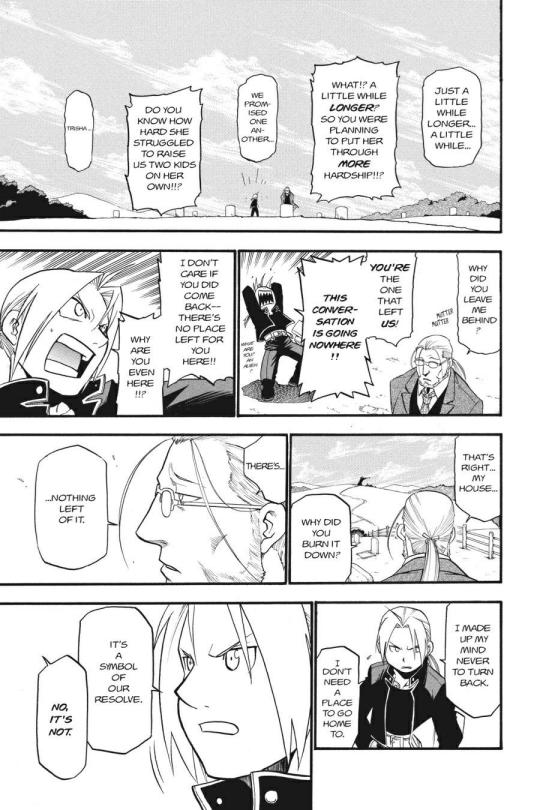
additionally, what i dislike about brotherhood’s portrayal of hohenheim’s return is that it obscures a lot of the conversations he has with both ed and pinako. he’s painted to be far more aloof and bordering on cold in the anime (and admittedly that works for an ed-based perspective of the scene, bc he’s not working off of all of the facts), but in the manga he’s awkward, lost, confused, and remorseful. even the way the final part of this conversation with ed is portrayed is a bit different in the manga bc of hohenheim’s wording. obv from ed’s perspective hohenheim’s analysis of his reasons for burning down the house is an attack on his and al’s wrongs, but taking into account what we know about the series and hohenheim’s backstory as a whole, it’s later easy to see that hohenheim is expressing regret and sorrow bc he knows exactly what ed feels like from personal experience. he’s not trying to chide ed or make him feel bad. he just understands him deeply and is sorry and confused that ed and al had to go through something of this magnitude
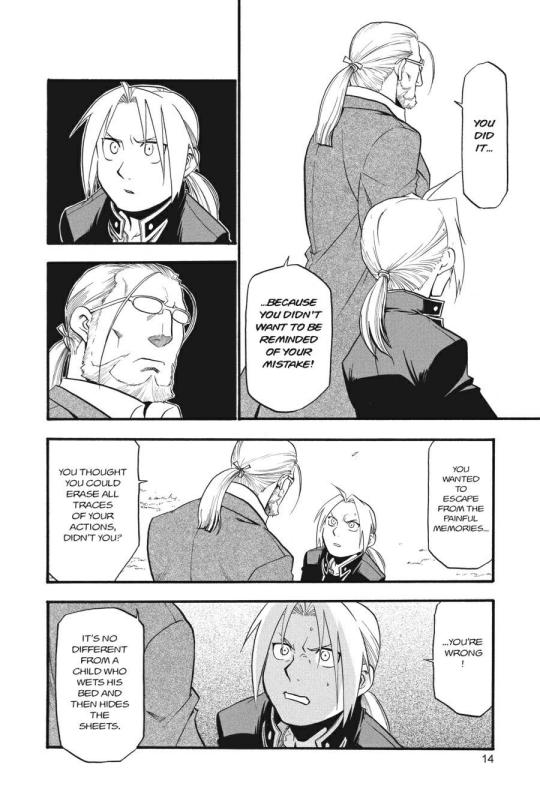


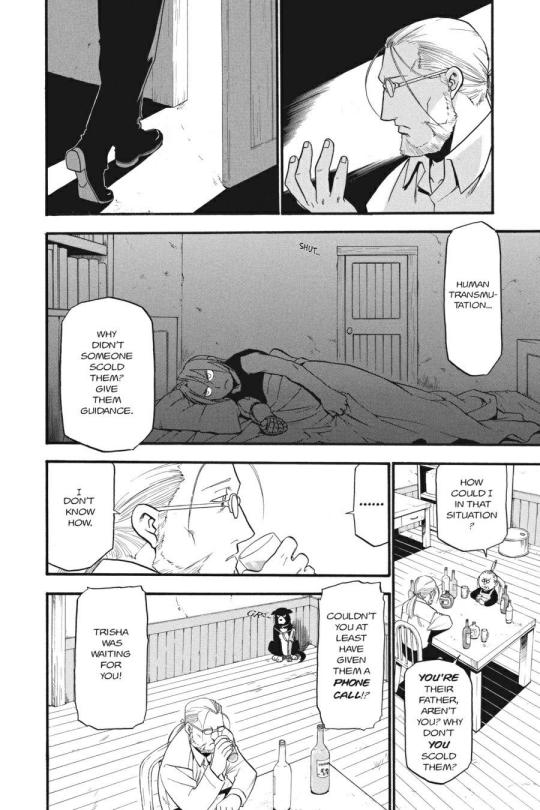
later with pinako, hohenheim also wonders why no one guided them otherwise, and it’s at this point that she criticizes him for failing to contact ed and al over the years that he was gone. i wholeheartedly believe she’s right to criticize him, esp since, like ed, she’s operating from a pov that doesn’t account for the fact trisha knew more about hohenheim’s reasons for leaving than she did; but i do think people nonetheless tend to approach the circumstances around hohenheim returning from a bit of a narrowed perspective. we already know per hohenheim and trisha’s promise that she always expected him to come back and knew she simply had to wait. did ed and al know that, though, or could she have predicted she would have died before hohenheim returned? no, and that’s not the kids’ fault. but i also think people fail to take into account that there’s not a lot hohenheim could have told a pair of kids who weren’t even ten years old about needing to be away from home because he needed to prepare for the day a homunculus would swallow their country whole. there’s a clever reference to what happened in xerxes in one of the books ed and al study as they try to learn how to bring back trisha, and they dismiss the story as a fairytale, with ed reasoning human transmutation is forbidden simply bc no one knows how to do it. there’s also the conversation between al and hohenheim later in the manga where hohenheim reveals his backstory and comments that he’d seriously doubt the sanity of anyone who'd so blindly believe him after his prolonged absence, but al expresses that it’s a truth easier for him to accept bc of his own condition. ed accepts it, too, but he’s clearly rattled by it all
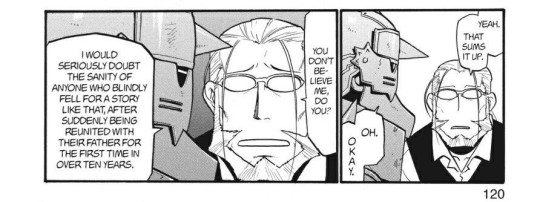


i think a lot of people take for granted whether a pre-human transmutation ed and al would have believed hohenheim even if he’d tried to divulge the truth to them at that age. at worst, it would sound like a ridiculous excuse to get away, and at best, they would still grow up feeling largely abandoned even if they somehow managed to understand that he had a responsibility. i don’t mean to say that all of these abnormal circumstances somehow give hohenheim total grace. he’s made mistakes in parenting, he knows it, he faces criticism from the ones that it’s hit the hardest, and he makes conscious attempts to rectify what wrongs he can. but i also think people sort of blindly assume that he immediately knew about trisha dying and the boys needing him in the aftermath of that, or that him calling in a few times would have solved all problems when he ultimately needed to be on the move constantly to prepare for the promised day in time. hohenheim was housing a little more than half a million souls that he had to steadily deposit around the country, and preparing for and executing that took him countless years. hohenheim and trisha made a promise to each other and it was painful, obv, but it was one they committed to and that neither of them expected to be broken so soon. hohenheim had faith in trisha that she would raise the boys properly until he returned, and she took upon that burden knowing what he had to do and that he would return to her. outside circumstances unfortunately damned them to their fates, and that’s where the series has its foundations
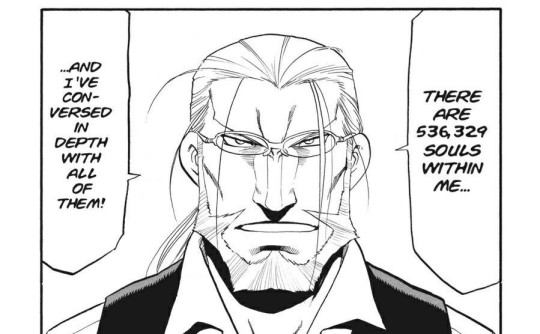
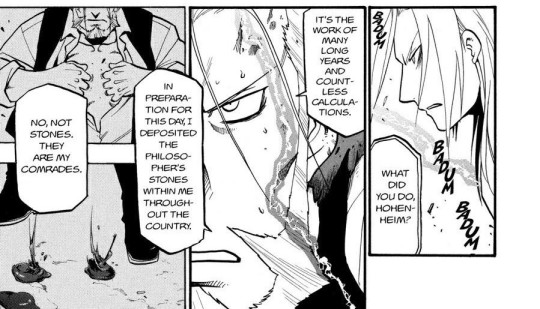
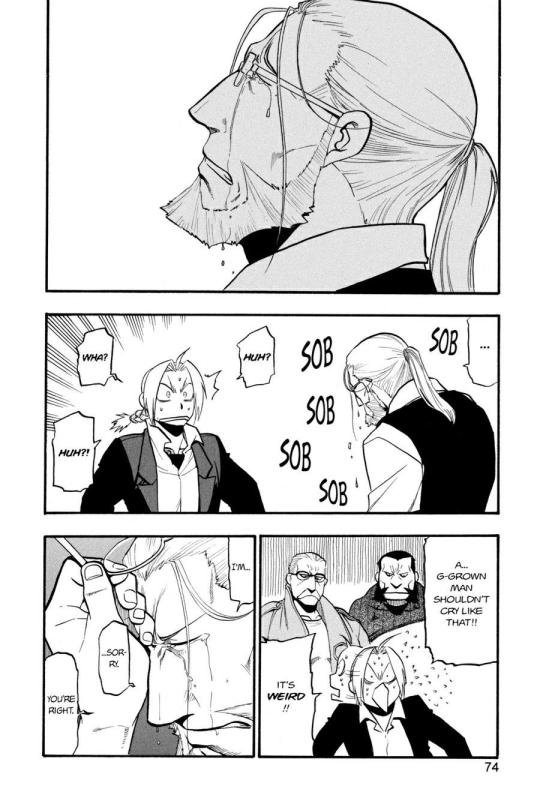

i agree with most people that it’s inaccurate to say hohenheim was a perfect parent, but at the same time, i don’t think being a good parent and being a perfect (or near perfect) parent are quite the same thing. to me, it’s not just about whether you’re there for your children physically but about what you do for them in principle. if he wanted to, hohenheim could have stayed home and damned not just another country (of fifty million people, as mustang later states, versus xerxes’s approximate one million population) but his own family to eternal purgatory and agony within the conjured body of a self-made god. but the truth is that hohenheim loved his family enough to do the difficult thing, and he decided to suffer a few more years so that he could live happily with them forever. his commitment to that endeavor, to me, was the ultimate representation of his desire to commit to his family and overcome his fears about being a monster unworthy of raising them. and ultimately, it didn’t work out exactly as he’d hoped, but it’s the fact that everything he did was for his family that gets to me and that i think people are all too willing to ignore in their assessment of him, in addition to people acting like just bc ed thinks one way, we, the omniscient audience, have to think the same way as well. ed is all of justified in his anger, and it’s unfair that he and al had to suffer through what they did, but i don’t think it’s farfetched to say he eventually would have understood why hohenheim made the sacrifices he did, and that his intentions were earnest, even if the outcomes were traumatic. sometimes that’s just the way life is, and we have to have the courage to move forward in the face of that adversity and strife. it’s the ultimate message of the series, and i think it’s one that applies as aptly to hohenheim as it does to ed himself
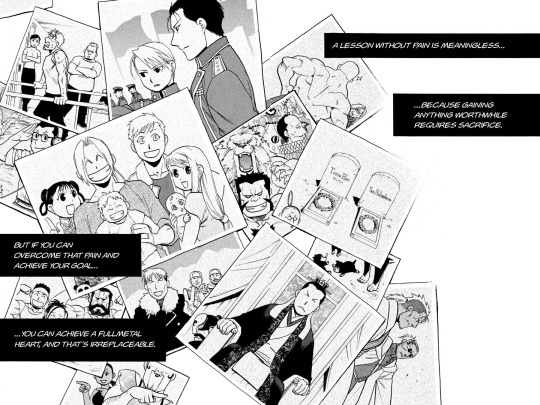
#van hohenheim#edward elric#alphonse elric#fullmetal alchemist#fma#mine:meta#god. this took me so long ajakljflkdsjglhnfdg#going back through the manga was fun tho i missed it#but on the other hand it also just increased my annoyance with brotherhood#there's so much of the manga brotherhood doesn't account for at all#like not even limited to hohenheim#i know people act like brotherhood is the perfect show but i really wish more people read the manga#i still have criticisms of it and the series' politics as a whole obv#but as with most fiction. the source material is still better than the adaptation lol
205 notes
·
View notes